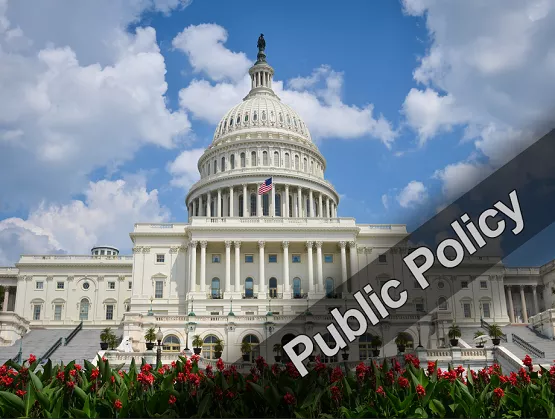
The 2022 midterm elections led to a significant shift in the political dynamic in Washington, even if they did not represent the sea change that some predicted. Republicans gained a marginal majority in the House of Representatives and are already pursuing an agenda that expectedly departs sharply from their Democratic counterparts on hot button issues like immigration and spending. However, the House will still likely see bipartisan work on areas of widespread agreement between the two parties like countering China. Meanwhile, Democrats retained control of the U.S. Senate and, as a consequence, will continue confirming the Biden Administration’s executive and judicial nominees even if fully enabling its policy agenda will no longer be possible because of a divided Congress.
Party control of the House and Senate during the 118th Congress, and the divergent policy agendas of each chamber, are operationalized through Committees. Following is an analysis of the leadership of Committees relevant to SEMI.
U.S. House of Representatives
Compared to the Senate, where the chamber’s rules empower the minority party to exert significant influence over legislation, the House is a more majoritarian institution. This means that House Committee chairs are the driving force behind the policy agenda and the minority has only as much sway over legislation and oversight activities as their majority counterparts will allow. Since the 118th Congress will operate as part of a divided government, only legislation with bipartisan support will become law.
 Appropriations – Representatives Kay Granger (R-TX) and Rosa DeLauro (D-CT) will serve as chair and ranking member, respectively, of the House Committee on Appropriations. House and Senate Appropriators are responsible for the annual appropriations bills that allocate all funding in the federal government’s discretionary budget. While the initial bills out of this Committee often reflect the partisan spending priorities of the majority, the final legislation is usually bipartisan given the Senate’s 60-vote threshold for passage. Chair Granger has stated that her goal will be to prioritize national security and reduce spending on other programs where possible.
Appropriations – Representatives Kay Granger (R-TX) and Rosa DeLauro (D-CT) will serve as chair and ranking member, respectively, of the House Committee on Appropriations. House and Senate Appropriators are responsible for the annual appropriations bills that allocate all funding in the federal government’s discretionary budget. While the initial bills out of this Committee often reflect the partisan spending priorities of the majority, the final legislation is usually bipartisan given the Senate’s 60-vote threshold for passage. Chair Granger has stated that her goal will be to prioritize national security and reduce spending on other programs where possible.
Armed Services – Representatives Mike Rogers (R-AL) and Adam Smith (D-WA) will serve as chair and ranking member, respectively, of the House Armed Services Committee (HASC). The most important legislative function carried out by HASC is to craft the annual National Defense Authorization Act (NDAA). As with appropriations bills, developing the NDAA is typically a bipartisan exercise given the Senate’s rules and widespread support for strong national security. Chair Rogers has indicated that his priority will be to ensure that the national defense industrial base has the capacity to provide the U.S. military with the resources and equipment necessary to deter Russian and Chinese expansionism. The availability of sophisticated technologies, including high-end microelectronics used for defense applications, will also likely be a major focus.
Education and Workforce – The Committee on Education and the Workforce will be led by Chair Virginia Foxx (R-NC) and Ranking Member Bobby Scott (D-VA). The Committee’s jurisdiction includes elementary and secondary education and workforce development legislation such as the Higher Education Act (HEA) and the Workforce Innovation and Opportunity Act (WIOA). Chair Foxx’s public statements indicate that among her top priorities will be advancing legislation supporting non-college, skills-based education programs.
 Energy and Commerce – The Committee on Energy and Commerce (E&C) will be led by Chair Cathy McMorris Rodgers (R-WA) and Ranking Member Frank Pallone (D-NJ). E&C has a broad jurisdictional mandate that includes energy policy, telecommunications, consumer protection, and environmental quality. Among Chair Rodgers’ top priorities will be to bolster American energy independence, including through policies that reduce U.S. dependence on China for critical materials, ensure data privacy, and promote U.S. leadership in advanced telecommunications technologies.
Energy and Commerce – The Committee on Energy and Commerce (E&C) will be led by Chair Cathy McMorris Rodgers (R-WA) and Ranking Member Frank Pallone (D-NJ). E&C has a broad jurisdictional mandate that includes energy policy, telecommunications, consumer protection, and environmental quality. Among Chair Rodgers’ top priorities will be to bolster American energy independence, including through policies that reduce U.S. dependence on China for critical materials, ensure data privacy, and promote U.S. leadership in advanced telecommunications technologies.
Financial Services – The House Committee on Financial Services is led by Chair Patrick McHenry (R-NC) and Ranking Member Maxine Waters (D-CA). Like E&C, this Committee has a wide jurisdiction that covers most aspects of the financial sector. One of Chair McHenry’s main priorities will be exploring the use of sanctions, export controls, and other financial tools to bolster U.S. economic competitiveness relative to China and to protect against the unintended and/or illegal transfer of sensitive intellectual property outside the United States.
Foreign Affairs – The House Foreign Affairs Committee (HFAC) will be led by Chair Michael McCaul (R-TX) and Ranking Member Gregory Meeks (D-NY). The Committee’s jurisdiction includes many activities and initiatives of the Departments of State, Commerce, and Defense that serve as instruments of U.S. foreign policy. Chair McCaul’s top concerns will include U.S. relations with China and the Committee’s oversight of export controls on advanced technologies.

Homeland Security – The Committee on Homeland Security (CHS) will be chaired by Rep. Mark Green (R-TN) with Rep. Bennie Thompson (D-MS) serving as ranking member. Chair Green is new to the role, having succeeded former Rep. John Katko (R-NY) as the top Republican on the Committee after he opted against running for reelection in 2022. Chair Green has indicated that he will focus the Committee’s attention on securing the U.S. southern border and bolstering the nation’s cyber defenses.
Judiciary – The House Judiciary Committee will be led by Chair Jim Jordan (R-OH) and Ranking Member Jerrold Nadler (D-NY). The Committee has jurisdiction over issues such as federal law enforcement, innovation issues such as patent and trademark laws, competition, and anti-trust laws, and immigration.
 Science, Space, and Technology – The House Committee on Science, Space, and Technology (SST) will be led by Chair Frank Lucas (R-OK) and Ranking Member Zoe Lofgren (D-CA). SST has jurisdiction over most federal science agencies and related legislation. SST’s oversight agenda will likely focus on the implementation of the CHIPS and Science Act as well as research activities authorized by the Infrastructure Investment and Jobs Act (IIJA) and the Inflation Reduction Act (IRA). Likely legislative priorities include reauthorization of the National Quantum Initiative Act as well as bills focused on critical materials, drone research, and weather forecasting. Chair Lucas has also expressed deep concern about research security and theft of intellectual property.
Science, Space, and Technology – The House Committee on Science, Space, and Technology (SST) will be led by Chair Frank Lucas (R-OK) and Ranking Member Zoe Lofgren (D-CA). SST has jurisdiction over most federal science agencies and related legislation. SST’s oversight agenda will likely focus on the implementation of the CHIPS and Science Act as well as research activities authorized by the Infrastructure Investment and Jobs Act (IIJA) and the Inflation Reduction Act (IRA). Likely legislative priorities include reauthorization of the National Quantum Initiative Act as well as bills focused on critical materials, drone research, and weather forecasting. Chair Lucas has also expressed deep concern about research security and theft of intellectual property.
Strategic Competition between the United States and the Chinese Communist Party – The Committee will be chaired by Rep. Mike Gallagher (R-WI) with Rep. Raja Krishnamoorthi (D-IL) serving as ranking member. The formation of the Committee was announced by Speaker of the House Kevin McCarthy (R-CA) at the beginning of the 118th Congress. Its primary aim will be to create a cohesive approach to the topic of competing with China by coordinating policy across other relevant committees such as HASC, HFAC, and SST. The new committee's work will include promoting supply chain independence, combatting intellectual property theft, and investigating allegations of human rights abuses.
Ways and Means – The Committee on Ways and Means is chaired by Rep. Jason Smith (R-MO), with Rep. Richard Neal (D-MA) serving as ranking member. It is Congress’ chief tax-writing committee and has jurisdiction over programs like Social Security, Medicare, and Temporary Assistance for Needy Families (TANF). Chair Smith is promoting a policy agenda that incentivizes R&D investment and empowers small businesses. He has also expressed interest in leveraging the tax code to decouple American supply chains from China.

U.S. Senate
While party control of the House changed hands following the midterms, Democrats managed to slightly expand their majority in the Senate from 50 to 51 seats.[1] As a result, Senate Committees will no longer feature even partisan splits and Democratic Chairs will be able to more freely exert control over policy agendas. Still, most legislation that makes it through the Committee process will need bipartisan support to pass the Senate, where the threshold for passage is 60 votes.
Appropriations – Like its House counterpart, the Senate Appropriations Committee is responsible for developing annual spending bills. In the 118th Congress, it will be led by Chair Patty Murray (D-WA) and Vice Chair Susan Collins (R-ME), each of whom succeeds a Senator who retired at the end of the last Congress.
Armed Services – The Senate Armed Services Committee (SASC) will be led by Chair Jack Reed (D-RI) and Ranking Member Roger Wicker (R-MS). As with HASC, SASC’s main legislative priority is to steward the annual NDAA, which both Members have committed to doing so n a bipartisan way. Among the most pressing concerns for both Chair Reed and Ranking Member Wicker will be shoring up the nation’s defense industrial base and ensuring that the U.S. has the capacity to produce the necessary weapons, munitions, and key technologies, including semiconductors, to sustain a major armed conflict should one arise while continuing to arm friendly nations like Ukraine.
 Commerce, Science, and Transportation – It is led by Chair Maria Cantwell (D-WA) and Ranking Member Ted Cruz (R-TX). The Senate Committee on Commerce, Science, and Transportation (CST) has a wide jurisdiction that includes many agencies such as the National Science Foundation, the National Aeronautics and Space Administration, the Department of Commerce, including the National Institute of Standards and Technology, and much of the Department of Transportation. Like SST on the House side, CST has primary oversight over the implementation of the CHIPS and Science Act.
Commerce, Science, and Transportation – It is led by Chair Maria Cantwell (D-WA) and Ranking Member Ted Cruz (R-TX). The Senate Committee on Commerce, Science, and Transportation (CST) has a wide jurisdiction that includes many agencies such as the National Science Foundation, the National Aeronautics and Space Administration, the Department of Commerce, including the National Institute of Standards and Technology, and much of the Department of Transportation. Like SST on the House side, CST has primary oversight over the implementation of the CHIPS and Science Act.
Energy and Natural Resources – The Committee on Energy and Natural Resources (ENR) is chaired by Senator Joe Manchin (D-WV) with Senator John Barrasso (R-WY) serving as Ranking Member. Its jurisdiction includes the Department of Energy (DOE) and the Department of the Interior (DOI), as well as major portions of the IRA, IIJA, and CHIPS and Science Act. Chair Manchin’s top priorities include examining the implementation of those bills.

Finance – The Senate Finance Committee is chaired by Senator Ron Wyden (D-OR), with Senator Mike Crapo (R-ID) serving as Ranking Member. The Committee covers taxation policy and various aspects of the financial sector, as well as export controls and trade agreements. It also has jurisdiction over domestic social spending programs such as Social Security, Medicare, Medicaid, and TANF. Among Chair Wyden’s top priorities will be overseeing the implementation of IRA provisions under the Committee’s jurisdiction and enforcing the United States-Mexico-Canada Agreement.
Foreign Relations – The Senate Foreign Relations Committee (SFRC) has similar jurisdiction as HFAC, covering U.S. foreign policy legislation. Chair Bob Menendez (D-NJ) leads the Committee alongside Ranking Member Jim Risch (R-ID). One of Chair Menendez’s top priorities will be using SFRC’s legislative and oversight authorities to counter China across economic, political, and technological spheres. He has been explicit about his concerns that the U.S. is not doing enough to provide a clear alternative to economic partnerships that China has been promoting to developing nations around the world.
 Health, Education, Labor, and Pensions – The Senate Health, Education, Labor, and Pensions (HELP) Committee is led by Chair Bernie Sanders (I-VT) and Ranking Member Bill Cassidy (R-LA). HELP has a wide jurisdiction that includes programs and legislation relevant to the high-skilled workforce including HEA and WIOA, which authorize programs for supporting college-level education and locally oriented job training, respectively.
Health, Education, Labor, and Pensions – The Senate Health, Education, Labor, and Pensions (HELP) Committee is led by Chair Bernie Sanders (I-VT) and Ranking Member Bill Cassidy (R-LA). HELP has a wide jurisdiction that includes programs and legislation relevant to the high-skilled workforce including HEA and WIOA, which authorize programs for supporting college-level education and locally oriented job training, respectively.
Homeland Security and Government Affairs – The Senate Homeland Security and Government Affairs Committee (HSGAC) is led by Chair Gary Peters (D-MI) and Ranking Member Rand Paul (R-KY). HSGAC has primary jurisdiction over much of the Department of Homeland Security as well as legislative and oversight responsibility for legislation designed to optimize the operations of the federal government. Among HSGAC’s recent activities is a push to assess the potential for national security vulnerabilities associated with consulting firms that have ties to both U.S. government and Chinese government and state-sponsored interests.
Judiciary – The Senate Judiciary Committee is led by Chair Richard Durbin (D-IL) and Ranking Member Lindsey Graham (R-SC). Like its House counterpart, the Committee presides over issues such as federal law enforcement and immigration. Immigration issues such as H-1B visas, which are in a state of flux at the moment with Biden Administration seeking to modernize the process, should receive attention in the 118th Congress in front of the Senate Judiciary Committee.
[1] The Senate Democratic caucus includes three Independents: Senators Bernie Sanders (I-VT), Angus King (I-ME), and Kyrsten Sinema (I-AZ).
Discover how SEMI Global Advocacy & Public Policy supports the microelectronics industry across trade, taxes, talent, and R&D or become involved by contacting advocacy@semi.org.
John Cooney is Vice President of Global Advocacy and Public Policy at SEMI.